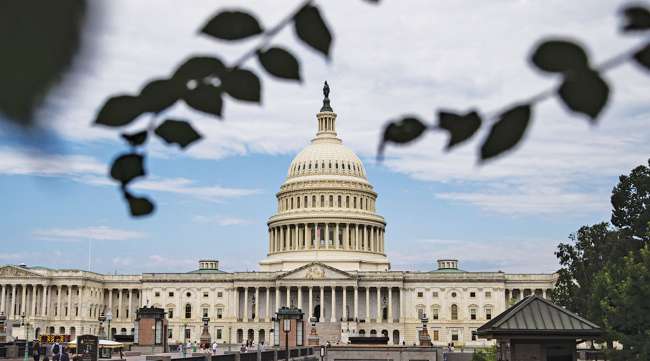Senior Reporter
Congress Approves Short-Term Bill, Averts Shutdown

[Stay on top of transportation news: Get TTNews in your inbox.]
Operations at the U.S. Department of Transportation will continue uninterrupted through mid-January as part of a short-term measure Congress approved days before a federal funding deadline.
The U.S. Senate on Nov. 15 voted 87 to 11 to clear a House-passed continuing funding resolution meant to avert a partial government shutdown. The legislation, which President Joe Biden is expected to enact, would fund DOT and agencies associated with agriculture, housing and energy programs through Jan. 19. The bill would provide funding for the remainder of the federal government, including the Defense Department, through Feb. 2.
As Congress stared at a Nov. 17 government funding deadline, Senate Majority Leader Chuck Schumer (D-N.Y.) called the continuing resolution’s passage a “great outcome for the American people.” Importantly, the New York Democrat emphasized that the short-term bill extends Congress’ window of opportunity for finalizing fiscal 2024 funding appropriations bills. “Today’s [continuing resolution] is a good first step and a very good omen for the future. I hope we see more bipartisanship down the line,” Schumer said Nov. 15. “Every time I’ve gotten on the phone with the speaker, I’ve stressed we need bipartisanship if we want to finish the appropriations process. I hope the new speaker continues to choose the bipartisan approach, as he commendably has in his first foray.”
Senate Appropriations Committee Chairwoman Patty Murray (D-Wash.) focused on the unfinished task specific to fiscal 2024 bills. “While I am glad to see the speaker abandon tying cuts or extreme policies to a [continuing resolution], he will also need to do that for our annual bills if we are going to be able to conference any of them,” she said.

Johnson
Missing from the short-term measure was certain emergency supplemental aid requested by the White House. Senate Democratic leaders insist they will pursue emergency funding legislation for overseas conflicts, primarily in Eastern Europe and the Middle East.
Shortly after the House’s passage of the continuing resolution on Nov. 14, Speaker Mike Johnson (R-La.) pointed to the potential for finalizing fiscal 2024 bills: “The passage of today’s continuing resolution puts House Republicans in the best position to fight for conservative policy victories.” The House voted 336 to 95 on the short-term bill.
“The innovative two-step approach takes Washington’s preferred Christmas omnibus monstrosity off the table, shifts the government funding paradigm moving forward, and enhances our ability to rein in the Biden administration’s failed policies and government spending,” the speaker continued. Omnibus is a term for a legislative package consisting of the 12 appropriations bills.

Granger
House Appropriations Committee Chairwoman Kay Granger (R-Texas) agreed with the sentiment that the short-term bill gave her colleagues additional time to negotiate long-term measures. “We still have a lot more work to do to get full-year bills enacted into law,” Granger said. “That is why I support the speaker’s reasonable plan to continue government funding into early next year. It buys us time to agree on a top-line funding level and negotiate final bills with the Senate.”
Before Congress’ approval of the continuing resolution, the Democrat-led Senate advanced its fiscal 2024 transportation appropriations bill. The Senate measure would provide $98.9 billion for the departments of Transportation and Housing and Urban Development. It would dedicate $20.2 billion for the Federal Aviation Administration, $16.8 billion for the Federal Transit Administration and $3.4 billion for the Federal Railroad Administration. The Senate bill also would provide the Federal Motor Carrier Safety Administration with nearly $1 billion for fiscal 2024.
Check out Transport Topics' updated Top 50 list of the largest freight transportation companies in the world and explore how these companies are re-evaluating their supply chains. Tune in above or by going to RoadSigns.ttnews.com.
On the House side, Republican leaders have been unable to advance their version of the fiscal 2024 transportation bill. The House’s $90.2 billion legislation would dedicate nearly $1 billion for FMCSA. It would provide $19.5 billion for FAA, $14.6 billion for FTA, $1.4 billion for FRA and $1.2 billion for the National Highway Traffic Safety Administration. On trucking policy, the House legislation would prohibit requirements linked to inward-facing cameras on commercial motor vehicles.
In addition to fiscal 2024 funding negotiations, Congress is tasked with finalizing before the end of the year its consideration of the annual Pentagon policy bill. The comprehensive measure also is known as the National Defense Authorization Act.
Want more news? Listen to today's daily briefing below or go here for more info:





